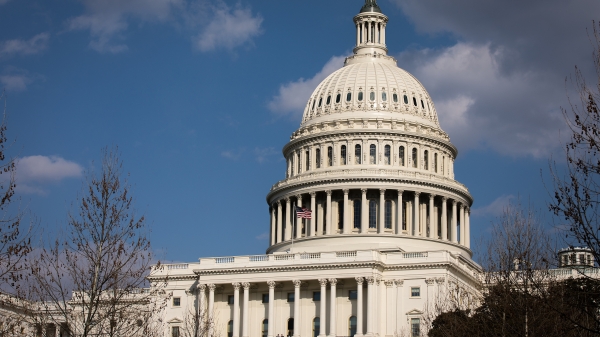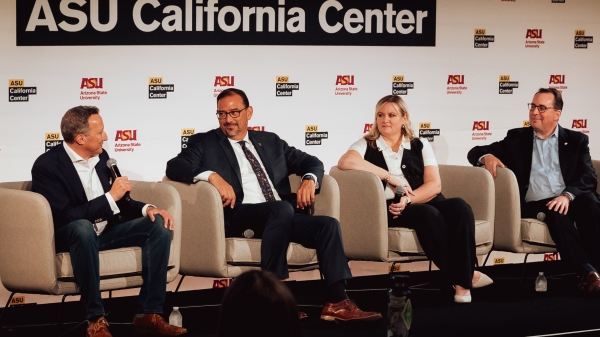ASU's Future Security Forum sees climate change, tense foreign relations as threats
Anne-Marie Slaughter, CEO of New America and professor of practice at Thunderbird School of Global Management at ASU, kicked off the 10th annual Future Security Forum, which gathered top policymakers, government and military leaders, experts and analysts in Washington, D.C., on Sept. 9–10. Photo by Hager Sharp
Worsening climate change and escalating tensions with China are two of the biggest issues affecting the future of the U.S., according to several experts who addressed a national security conference held by Arizona State University this week.
The 10th annual Future Security Forum was held Monday and Tuesday in Washington, D.C. The event is sponsored by ASU and the New America think tank, in collaboration with Security + Defense PLuS.
The forum gathered policymakers, government and military leaders, experts and analysts to discuss what global security will look like over the next decade.
The partnership with New America, and the forum, are ways that ASU translates its expertise into action, according to Jim O’Brien, senior vice president of university affairs and chief of staff to ASU President Michael Crow.
“This partnership is a way that the university is attempting to step out and reach more people with more ideas that have real impact,” he said.
“We have fantastic ideas in the institution, and we have fantastic people, but we have to find pathways and mechanisms to carry that out into the world.”
Over the course of two days, panelists touched on issues surrounding war, climate change, pandemics and more.
A new Cold War with China and the war in Ukraine
Dmitri Alperovitch, founder and former CTO of CrowdStrike, said that the U.S. is now in a Cold War with China, much like it was with the Soviet Union decades ago, with competition for supremacy, an arms race, a technology race and a space race.
The one difference is the deep economic relationship the U.S. has with China that it never had with the Soviet Union.
He said that that it’s crucially important for the U.S. to help maintain Taiwan’s independence, not only for its economic importance, particularly because it makes 40% of the world’s microchips, but also for its strategic role.
Meanwhile, Russia is not ready for peace, according to Evelyn Farkas, executive director of the McCain Institute and former deputy assistant secretary of defense for Russia/Ukraine/Eurasia.
“For now, the battlefield has to be shaped further, the political environment has to be shaped further, and the economic environment needs to be shaped further to incentivize the Russians to actually sit at the negotiating table in a serious fashion,” she said.
Farkas believes Putin is waiting to see who will be elected president of the U.S.
“He's banking on, ultimately, that the West will grow weary, regardless of what happens in our elections," she said.
Climate change and refugees
Climate change is forcing the U.S. to change its perception of refugees as victims of persecution, according to Elizabeth Campbell, deputy assistant secretary, Bureau of Population, Refugees, and Migration in the U.S. Department of State.
Much of the migration at the Southwest border is driven by people who can no longer farm in their home areas because of extreme heat and drought.
“One of the biggest problems … is that we do not have the conceptual, legal or operational frameworks in our government or in an intergovernmental system to respond effectively,” she said.
And current policy assumes that once conditions stabilize, the refugees can go home.
“We have to acknowledge that migration itself is a climate adaptation tool,” Campbell said.
Peter Schlosser, vice president and vice provost of Global Futures at ASU, urged fast action on preparing for the effects of climate events, such as typhoons.
“We are just, in my view, normalizing it. We are not paying enough attention, and that is something that will catch up with us in the near future,” he said.
Melting ice could raise the sea level by several feet.
“Ninety percent of the exchange of goods internationally goes across the ocean. By definition, all the port infrastructure for that shipping is at sea level. So now imagine you raised that by nine feet,” he said.
“We have not even started to think what that means.”
Planning for a pandemic
George Poste, chief scientist and Regents Professor of the Complex Adaptive Systems Initiative at ASU, painted a grim picture of the “lessons learned” from the COVID-19 pandemic.
“I think the bottom line in that is we've learned little, at least in terms of implementation,” he said.
“But I think the broader issue is that it's quite remarkable how quickly it's gone ‘out of sight, out of mind’ as a social-cultural issue but also as a policy issue.”
Poste listed many failures during the pandemic, including inability to quickly develop a test, lack of medical-supply stockpiles, disrupted supply chain, lack of investment in public health, poor communication and irresponsible behavior by the media.
“The biggest single thing in the first wave of this in the Trump administration was the pernicious and corrosive effect of the media in always wanting to have a ‘gotcha’ moment,” he said.
“I would love to see the new administration actually establish a cabinet secretary for biosecurity. And it's not just pandemics — it's food, it's water, it's ecosystems, it's climate. And that's a very complex remit.”
AUKUS industry challenges
Three years ago, the United States, Australia and the United Kingdom created a security partnership, called AUKUS, to strengthen advanced defense capabilities, including helping Australia develop long-range subs powered by nuclear energy.
Security + Defence PLuS is an initiative of the PLuS Alliance — a partnership between ASU, King’s College London and the University of New South Wales. S+D PLuS provides research, educational offerings and events to support AUKUS.
Matt Hulver, vice president of knowledge enterprise initiatives at ASU Knowledge Enterprise, said that ASU is always thinking about how to make an impact.
“We can't have the impacts as a university, and I think S+D PLuS can’t have the impacts we desire to have, unless we are partnering across many sectors, and that includes industry,” he said.
Workforce development is critical for the defense industry, according to Ashley Schneider, director of AUS/UK emerging markets at HII.
“Global stability is really about deterrence, and deterrence is really about industrial capability. And industrial capability is about having a workforce that can do the work. So whether it's making the widgets with these small-to-medium enterprises in Australia, all the way to assembling and testing and operating nuclear power submarines, it's all about workforce,” she said.
“We need to get students interested about working in defense and interested in working in nuclear and being OK with that.”
Chris Montferret, vice president of strategy and business development for maritime and strategic systems at General Dynamics Mission Systems, agreed on the push for more awareness of defense careers.
“We spend a lot of energy on our new hires to get them to understand the mission and why the mission is important and the fact that lives are at stake and what it means to have a strong defense and a strong deterrence strategy,” he said.
“That’s one area in the curricula where we can augment to start to align more closely with the mission.”
More Local, national and global affairs

Research Engagement Office helps connect ASU expertise with US priorities
The image of a scientist working in a lab or out in the field is familiar to many. But there’s an important aspect of research that happens far from either of those locales: efforts within the halls…

Election officials say meticulous preparation ensures trustworthy results
Election officials from California, Arizona and Nevada discussed hot topics in elections administration at the ASU California Center Broadway in downtown Los Angeles during the first public event of…

2 ASU students with a passion for public service receive prestigious Voyager Scholarship
A $50,000-plus scholarship that can set a student on the path to a successful future in public service was awarded to two Arizona State University students this fall.Sierra Jones and Sage Furr-…